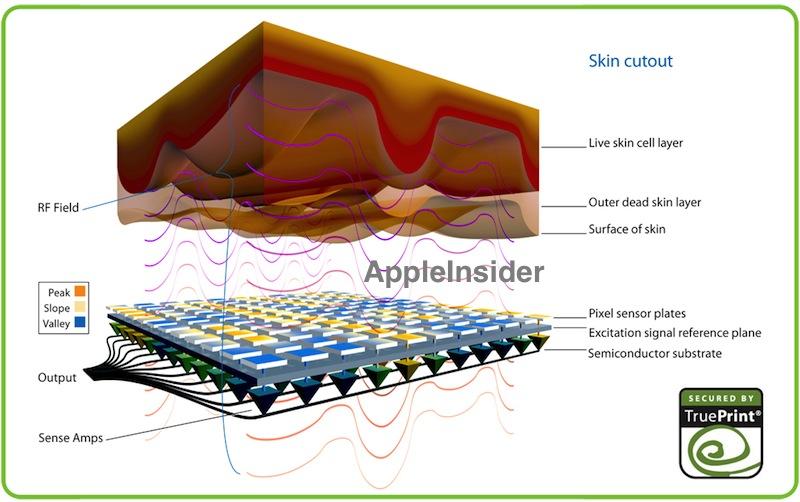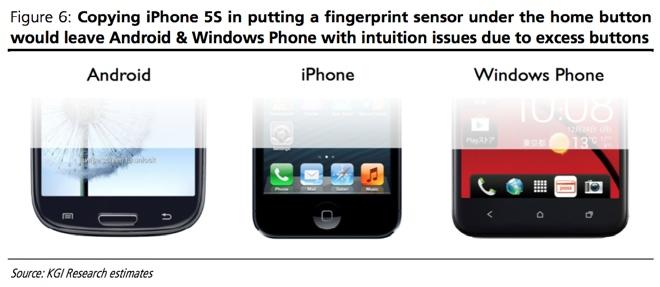Rumors of a secure fingerprint scanner in Apple's anticipated "iPhone 5S" continue to surface, with one new report claiming the feature will also appear in an Apple "iWatch."
Analyst Brian White of Topeka Capital Markets believes both the "iPhone 5S" and so-called "iWatch" will include fingerprint identification technology after meeting with a component supplier in a tour of China and Taiwan. He revealed the details of his meetings in a research note to investors that was provided to AppleInsider.
Apple's alleged fingerprint scanner will be used for "essential security purposes," he said. He expects its appearance will open up other opportunities for Apple, specifically the ability to enable credit card payments.
White compared Apple's alleged fingerprint scanning technology to Siri, the defining feature of the iPhone 4S when it launched in 2011. He believes a secure fingerprint reader will be the main selling point of an "iPhone 5S," which he expects will launch in July.
Beyond the next iPhone, White believes Apple's fingerprint scanning technology will come to other devices from the company, namely an "iWatch" wrist accessory that he expects will launch this year. In his tour, he found "early signs of movement in the supply chain," signaling Apple could be ramping up to produce such a device.
He also suggested in a separate note issued on Wednesday that an "iWatch" could play an important part with an Apple television set. White also gave details on a supposed "iRing" that would be worn on a user's finger and would aid in detecting motion controls with an Apple television.
Speculation of Apple's interest in secure fingerprint scanners has been driven by the company's acquisition of AuthenTec last year for $356 million. That company made a "Smart Sensor" component that could embed fingerprint readers underneath a touchscreen display.
Rumors of a fingerprint reader in an "iPhone 5S" gained steam earlier this year, when analyst Ming-Chi Kuo of KGI Securities said Apple plans to include one embedded under the device's home button. Kuo has a strong track record in predicting Apple's future product pipeline — in particular, he accurately predicted the company's entire fall lineup last year.
According to Kuo, the new fingerprint scanner would allow Apple to replace the user of usernames and passwords, giving users the ability to authenticate in a more efficient manner. He also expects the scanner will integrate with applications such as Passbook to enhance their functionality.
 Neil Hughes
Neil Hughes








-m.jpg)






 Christine McKee
Christine McKee
 Malcolm Owen
Malcolm Owen
 Marko Zivkovic
Marko Zivkovic

 Andrew Orr
Andrew Orr
 Andrew O'Hara
Andrew O'Hara
 William Gallagher
William Gallagher




-m.jpg)



33 Comments
If the iPhone 5S does have a fingerprint scanner I might retire my iPhone 4S. If not I'll probably await the redesigned (hopefully) iPhone 6.
I have a couple problems with this purported solution to FP scanning.
1. not everyone uses the same finger every time to press the home button...or the same hand every time for that matter. So the scanner would have to identify all 10 of your fingers on initial setup.
2. the home button is not the same size as most people's fingers, sometimes you press it with the tip of your finger, sometimes the center. No one presses it in the same spot every time.
3. sometimes if my phone or iPad is lying on my desk and i want to check the time or see the home screen, I do one of two things: press the home button or press the power button on the top.
4. this doesn't seem like an invisible tech. to me it would have to be instant that it scans and we all know scanning tech is slow. If you want to unlock your phone quickly and within a reasonable amount of time, this is not a good solution.
How do you overcome this? I have no idea, but it doesn't sound like a reliable solution to security. Heck, the slide to unlock works about 90% of the time for me. Maybe my fingers are too callused to register on the touch screen?
Point is, something that should be an almost invisible tech should not have such complications, especially from a company like Apple.
I have a couple problems with this purported solution to FP scanning.
1. not everyone uses the same finger every time to press the home button...or the same hand every time for that matter. So the scanner would have to identify all 10 of your fingers on initial setup.
2. the home button is not the same size as most people's fingers, sometimes you press it with the tip of your finger, sometimes the center. No one presses it in the same spot every time.
3. sometimes if my phone or iPad is lying on my desk and i want to check the time or see the home screen, I do one of two things: press the home button or press the power button on the top.
4. this doesn't seem like an invisible tech. to me it would have to be instant that it scans and we all know scanning tech is slow. If you want to unlock your phone quickly and within a reasonable amount of time, this is not a good solution.
How do you overcome this? I have no idea, but it doesn't sound like a reliable solution to security. Heck, the slide to unlock works about 90% of the time for me. Maybe my fingers are too callused to register on the touch screen?
Point is, something that should be an almost invisible tech should not have such complications, especially from a company like Apple.
You're assuming that the scanner is under the home button when there is no reason to do so. Also, they will probably let you pick which finger you use in that if they didn't, huge numbers of people couldn't use the phone.
You're assuming that the scanner is under the home button when there is no reason to do so. Also, they will probably let you pick which finger you use in that if they didn't, huge numbers of people couldn't use the phone.
you miss my point, in that not everyone uses the same finger all the time to unlock their phones. For this to be a reliable and invisible tech...meaning is just works...requiring a only one finger to unlock the phone is not a good solution.
Also, the article does state that the FP scanner would be under the home button:
Hopefully this will me the end of passwords on the iPhone. I have some really long passwords (for banking etc.) that have number and punctuation in them. On the small iPhone screen it can a while to enter and multiple tries.getting rid of passwords would make my phone sooo much easier to use.